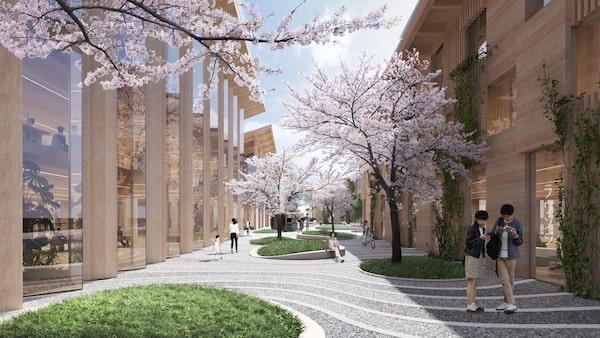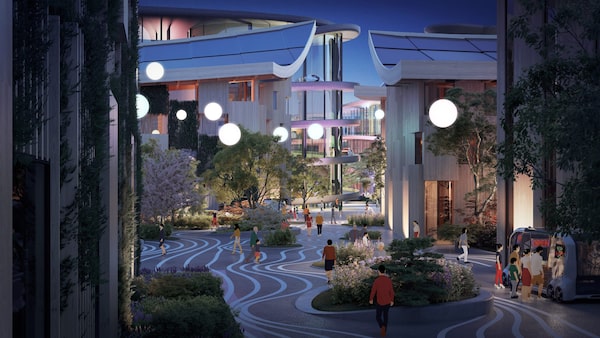
Toyota plans to develop a 175-acre municipality at the foot of Japan's Mount Fuji.
Toyota doesn’t want to just be a car maker any more – the Japanese company also wants to build the cities its vehicles drive in.
The firm announced its ambitious plan to develop Woven City, a 175-acre prototype “smart” municipality at the foot of Japan’s Mount Fuji, at the Consumer Electronics Show on Monday.
Touting it as the opportunity of a lifetime, Toyota president Akio Toyoda said Woven City will be a living laboratory where future technologies – from autonomous vehicles to smart-home sensors and robotics – can be tested and incorporated into daily life.
“Some of you are wondering, ‘Has this guy lost his mind? Is he a Japanese version of Willy Wonka?’ ” Toyoda said during his keynote address. “Perhaps, but I truly believe this is a project that can benefit everyone, not just Toyota.”
Woven City will break ground in early 2021, with an aim of being operational and housing about 2,000 people within its first five years. Residents will be mainly Toyota employees and their families, retirees, partner companies and visiting scientists. The company plans to allow outside researchers to test their technologies through short-term projects.

Danish architect Bjarke Ingels is designing the buildings in Woven City.
The city’s buildings are being designed by Danish architect Bjarke Ingels, whose company Bjarke Ingels Group (BIG) has previously worked on headquarters for Google and Lego. BIG has also been involved in several Canadian projects, including the recently completed Vancouver House and the continuing redevelopment of Toronto’s King Street West neighbourhood.
Woven City’s streets will be divided into three types of usage: roads for faster vehicles, pathways for a mix of lower-speed mobility options and pedestrianized promenades. The streets will weave together to form an “organic grid pattern” that will help test autonomous vehicles across mobility types, hence the title Woven City.
The entire project will also be powered by Toyota’s hydrogen power cells, with autonomous service vehicles operating in a network of tunnels beneath the surface.

The project takes its name for the way the streets will 'weave' together in an organic grid.
James Kuffner, chief executive officer of the Toyota Research Institute for Advanced Development, is leading the effort. A former robotics professor at Carnegie Mellon University, Kuffner says the goal is to create an environment where new mobility technologies can be tried and deployed without being slowed down by government delays.
Woven City will replace a recently closed factory on Toyota-owned land in Shizuoka Prefecture. The government there is on board and is expecting considerable economic investment from the project, according to Kuffner.
“It's a privately owned piece of land that is significant enough in scale that it's meaningful as a place to learn,” he said in an interview. “We hope to accelerate the typically long cycles in city planning and design.”

The residents of Woven City will be mainly Toyota employees and their families, along with retirees, visiting scientists and employees of partner companies.
Toyota and other car makers are finding it difficult to easily deploy autonomous technologies in existing cities that are not necessarily designed for them. Woven City is an attempt to do the opposite – design a municipality around the technology.
“We want it to be real world so that we’re not living in a lab even though we call it a living laboratory,” Kuffner said. “It’s meant to be a practical way to understand how we would build a smart city that people would actually want to live in.”
The effort is sure to provoke questions around corporate overreach, privacy and data ownership. Google’s similar effort in Toronto through its Sidewalks Labs project – situated on 12 acres of city waterfront property – has been mired in controversy over the past year, with citizen groups objecting to how much data the company will have access to and ownership of.
Kuffner, who spent seven years working in robotics at Google, said Woven City will be different in that its residents’ desires will take priority. They will have control over which types of data they share with Toyota and its partners.
“Toyota has a very successful business in making products that help people move and we want to keep doing that so our motivation is a little different than some other companies that are in the space where, you know, all the data's being monetized,” he said. “This is a differentiator for us.”
Some industry analysts believe Toyota’s ambitious megaproject is a move in the right direction, although they caution it is likely to have a similarly huge price tag. The automaker hasn’t revealed how much it expects Woven City to cost.

The community will be powered by Toyota's hydrogen power-cell technology.
“It’s going to take a boatload of money. They’re going to need a massive amount of partnership to get this off the ground,” said Mark Boyadjis, global technology lead for the automotive advisory team at analysis firm IHS Markit.
“They’re recognizing that with a fundamentally new device [such as the autonomous car] they also need to learn about the fundamental changes that are going to happen to the network – city infrastructure, parking, streets and so on.”
Shopping for a new car? Check out the new Globe Drive Build and Price Tool to see the latest discounts, rebates and rates on new cars, trucks and SUVs. Click here to get your price.
Stay on top of all our Drive stories. We have a Drive newsletter covering car reviews, innovative new cars and the ups and downs of everyday driving. Sign up for theweekly Drive newsletter, delivered to your inbox for free. Follow us on Instagram,@globedrive.